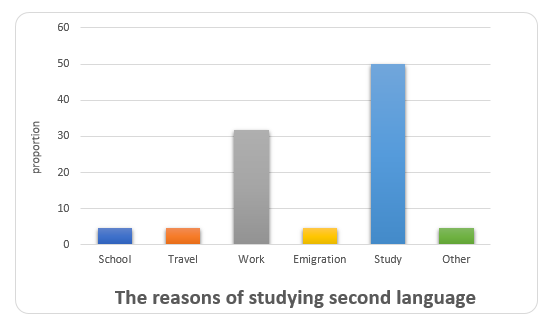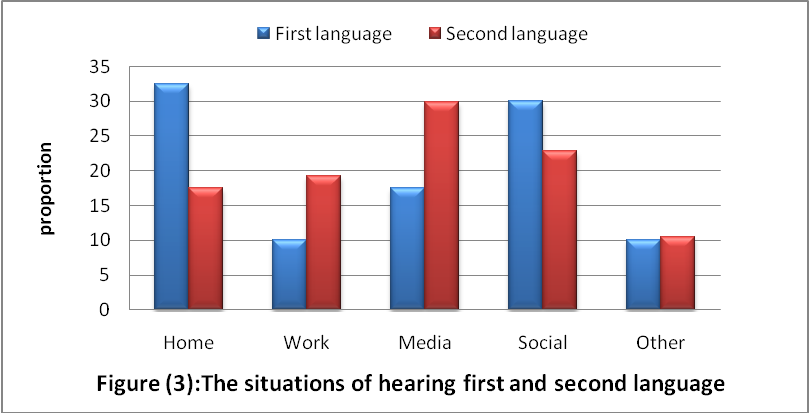Background
English language has become an international language over the last few decades. The number of people who speak English has increased significantly due to the importance of this language as an international language. Some non-English countries have begun to design new curricula that encourage people to learn the English language. Some people believe that a first language could be affected by learning English as a second language.
First language’s speaking, reading, listening, writing skills and losing some first language’s vocabulary are examples of the main skills that would be affected, as those people believe. Others assert that people who speak English as a second language also speak their first language perfectly without any negative consequences. It can be a useful idea to know how learning a second language affects the first language by asking some bilingual people. This report will also show how the different ages of respondents affected their answers.
Aims
The purpose of this research was to focus on the effects of learning a second language on the first language, and which were possibly the most-effected age group. Additionally, the purpose also includes the possible negative effects on the skills of the first language such as, reading, listening, writing, and speaking skills. Moreover, the purpose also include to enquire about the main reasons why respondents are willing to learn another language, and what factors made them think that just one language has not enough.
Method
The sample
The respondents were selected from a variety of ages, gender (figure1), social and educational backgrounds. The sample size was 18. They all live in urban areas.

Data collection
This was carried out through the initial process of a questionnaire. The questionnaire was trialled with a sample of 15 people. After that, a new upgraded questionnaire was created and 18 respondents were finally surveyed. This comprised 11 questions and focused on some of the effects of learning the second language on the first language.
Findings
Proportions and reasons of learning the second language
The majority of respondents (94%) speak another language beside their first language. Only about 6 per cent of them stated that they speak just one language. Moreover, according to the respondents there were several reasons behind learning the second language. It can be seen from the figure2 that the main reason for learning the second language was studying. In other words, half of the respondents said that education was the main reason for learning the second language. The second main reason was working abroad which was about 32 per cent. Furthermore, it was found that more than 80 per cent of the respondents started learning the second language between 13 and 19 years old.

Effects on speaking skills and vocabulary
Turning to the effects of learning the second language on the first language, about 47 per cent of both male and female respondents thought that their first language’s speaking skills has been affected negatively after learning the second language. According to a Vietnamese female respondent (18-25 years old), her first language’s speaking has become hesitant while the second language’s (English) speaking has been more fluent. Additionally, some of the pronunciation’s skills have also been affected. An Italian male (more than 33 years old), for example, mentioned that his pronunciation of some Italian words had become not clear.
Another example of this effect is according to a Vietnamese male (18-25 years old), the pronunciation and his sound of some Vietnamese letters have been influenced, after learning the second language. In contrast, just over half the respondents believed that these types of skills have not been affected negatively. First language’s grammar has also been affected negatively according to five out of ten people. Moreover, in terms of the first language’s vocabulary about 35 per cent of both male and female respondents stated that they did not lose any of them, while three out of ten replied that some of their first language’s vocabulary have been lost after learning the second language.
A Saudi female (26-33 years old), for example, asserted that some of her Arabic vocabulary has been lost, as a result she has started using several English words instead of her first language’s words. Moreover, approximately 17.5 per cent have lost a little vocabulary.
Effects on reading and writing skills
The effects on the first language’s reading skills were another aspect covered by this research. Nearly 30 per cent said that sometimes they read in their first language. In addition, about 29.5 per cent answered that occasionally they read in their first language. However, the surprising result was that approximately 12 per cent of the respondents never read in their first language after learning the second one.
Turning to the effects of learning second language on first language’s writing skills, about the half of the respondents believed that their first language’s writing skills have not been influenced negatively by learning the second language. However, about four out of ten (37%) were not sure if the second language has affected their writing skills or not. On the other hand, nearly 13 per cent of the respondents found this negative influence on their writing skills. For instance, one of the male respondents asserted that his Arabic language’s writing skills have been forgotten after learning English as a second language.
Effects on listening skills
First language’s listening skill also has been influenced in many situations. According to a significantly larger proportion of respondents, listening to their first language at home was more than the second was. In other words, listening to their first language at home was the highest proportion by about 35 per cent. In addition, the second highest percentage was for the social situations about three out of ten people. Nevertheless, listening to the first language at work was the lowest, there were about 10 per cent of the respondents answered that they have heard the second language in their work more than their first language.
Turning to the situations of the second language’s listening skill, it can be illustrated from the graph in (figure 3) that listening to the second language in media was the greatest amount by approximately 30 per cent. Additionally, the second greatest percentage of the second language’s listening skill was for the social situations by nearly 24 per cent. On the other hand, the lowest proportion of the second language’s listening skill was approximately 17 per cent at home.

Proportion of using first language and second language
The proportion of using the first language to the second, according to the respondents, illustrated that there were about 23.5 per cent said that they use the first language (70%) much more than the second language (30%). In addition, about 24 per cent of respondents stated that the percentage of using both were 60 per cent for the first language whereas the second was about 40 per cent. On the other hand, over 17 per cent of the respondents answered that the proportion of using the first language has been reduced by 30 per cent or less, after they learnt the second one. Turning to the respondents’ opinions, the majority (88.24%) suggested that all schools worldwide should teach a foreign language.
Conclusions
It was clear that there was a negative impact in the first language skills such as, reading, listening, speaking and vocabulary, writing, and grammar. Moreover, it can be seen that using the first language has decreased after learning the second language. Nevertheless, the second language has not affected the first language of some respondents negatively.
Recommendations
Due to the importance of both the first language, as one of the main cultural aspects, and the second language, education systems and schools should improve their curriculum in order to support students learning foreign language beside their first language. This improved curriculum should be designed by depending on safe educational methods taking care of the students’ first languages’ skills. It would be suggested by this research that useful ages for learning another language without these negative effects is between 13 and 19 years old. Accordingly, educational systems should pay attention to the advantage of these ages and teach them foreign languages.
S. Albhijan, K. Alharbi, & F. Aljohani The effects of learning second language Of.
